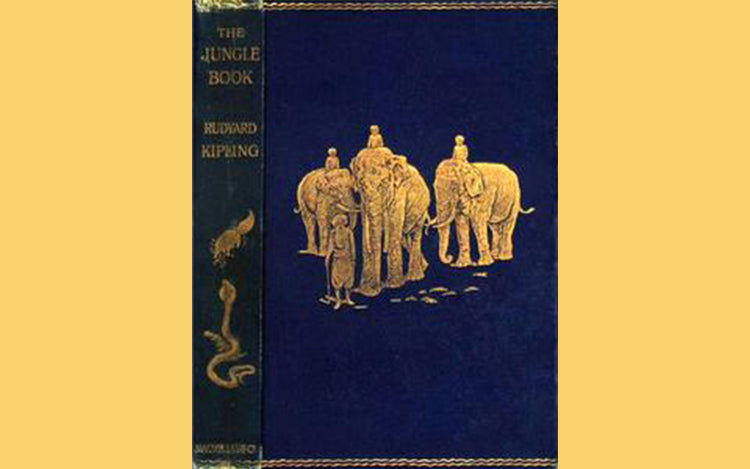
A Review of The Jungle Book by Rudyard Kipling

“For the strength of the Pack is the Wolf, and the strength of the Wolf is the Pack.” – Rudyard Kipling (1865 – 1936)
Rudyard Kipling was a Victorian author who honored nature and the native culture of India with his “new” way of cultivating the art of storytelling. He was an English imperialist who even made the Hindus smile.
Kipling was born in India and raised as an Anglo-Indian there for the first 6 years of his childhood. He said, “In the afternoon heats before we took our sleep, she (the Portuguese ayah, or nanny) or Meeta (the Hindu bearer, or male attendant) would tell us stories and Indian nursery songs all unforgotten, and we were sent into the dining-room after we had been dressed, with the caution ‘Speak English now to Papa and Mamma.’ So one spoke ‘English’, haltingly translated out of the vernacular idiom that one thought and dreamed in.”
He returned to India from his schooling in England when he was 16, and later said, “My English years fell away, nor ever, I think, came back in full strength.” Kipling went on to become a Freemason in about 1885. He was the Secretary of a Lodge in Lahore which included Christian Englishmen, Brahmins, Hindu Reformists, Mohammedans and Indian Jews. He was connected with those in India who pioneered religious, social and educational transformation of the Hindu community in the 19th century. The ideals and inspiration of his Masonic experience poured out into the ink of his later works in the form of style, rhythm and rhyme.
T.S. Eliot once forgave Kipling of his imperialism by saying, “An immense gift for using words, an amazing curiosity and power of observation with his mind and with all his senses, the mask of the entertainer, and beyond that a queer gift of second sight, of transmitting messages from elsewhere, a gift so disconcerting when we are made aware of it that thenceforth we are never sure when it is not present: all this makes Kipling a writer impossible wholly to understand and quite impossible to belittle.”
The Jungle Book is a collection of Kipling’s most beloved stories with some of the illustrations drawn by his artist father. These stories were written in 1894 when Kipling lived in Vermont. The stories are rooted in ancient Indian fables, using human-like animals to teach moral lessons about freedom, compassion and respect. Kipling used his experiences, his dreams, and all the beast-tales he had ever heard about the Indian jungle, to write about the laws for the safety of individuals, families, and communities. His work has been interpreted as allegories of the politics and society of nineteenth century India.

The stories revolve around the adventures of Mowgli, the abandoned “man cub” who is raised by a family of wolves since birth. Mowgli must leave the wolf den when Shere Khan the tiger fills the jungle with fear. Mowgli learns valuable life lessons on his journey of self-discovery. Mowgli knows that his knowledge as a human can be used both to improve or to destroy the home of his friends. Mogli teaches us to always try to make the right decision.
Raksha, the Mother Wolf deeply cares for her pups, including Mowgli, whom she adopts as her own. Raksha defends him from Shere Khan when the tiger comes to the watering hole during the drought. From Raksha we learn the strength and beauty of motherhood and family.
“No matter where you go, or what they may call you, you will always be my son.” -Raksha
Baloo the bear is the teacher of the cubs of the wolf pack. His most challenging student is Mowgli. Baloo teaches Mowgli the Law of the Jungle, to honor the other animals, and to find one’s own happiness. Baloo taught Mowgli about the simple pleasures of life, and that worry and struggle must not get you down. We must proactively watch our moods and throw out any poisonous thoughts of fear, anger, jealousy or hatred.
Shere Khan the tiger taught Mowgli to face his fears, and to build up the courage and confidence to be bold enough to tie a tree branch to the tail of the tiger so he would run away in fear. Fear is a demon within ourselves that we must conquer. Mogli used his man skills to outwit the tiger. Shere Khan also showed us that resentment is a heavy burden to carry through life.
Rikki–Tikki–Tavi, the heroic mongoose that fights the cobras, teaches us to be brave and loyal. We learn from him how to be protective of others, help those in need and to cultivate friends.
Hathi is the leader of the elephants. He is old and wise and represents order, dignity and obedience to the Law of the Jungle. Hathi is patient and goes forward slowly like a yogi.
Bagheera, the black panther serves as friend, protector and mentor to the “man-cub” Mowgli. He tried to give Mowgli advice about the dangers of the jungle. We can all learn to listen when wise people offer advice.
“Everybody knew Bagheera, and nobody dared to cross his path; for he was as cunning as Tabaqui, as bold as the wild buffalo, and as reckless as the wounded elephant. But he had a voice as soft as wild honey dripping from a tree, and a skin softer than down.” — Rudyard Kipling, The Jungle Book
Akela, the great grey wolf, is the gentlemanly leader of the pack and leads the council meetings with strength and cunning.
The magic and fantasy of Kipling’s lifelong creativity must have come from deep within his soul, his study of the transformation of human nature from the animalistic to the finely developed, and from the wisdom in stories that have come down through the ages.



